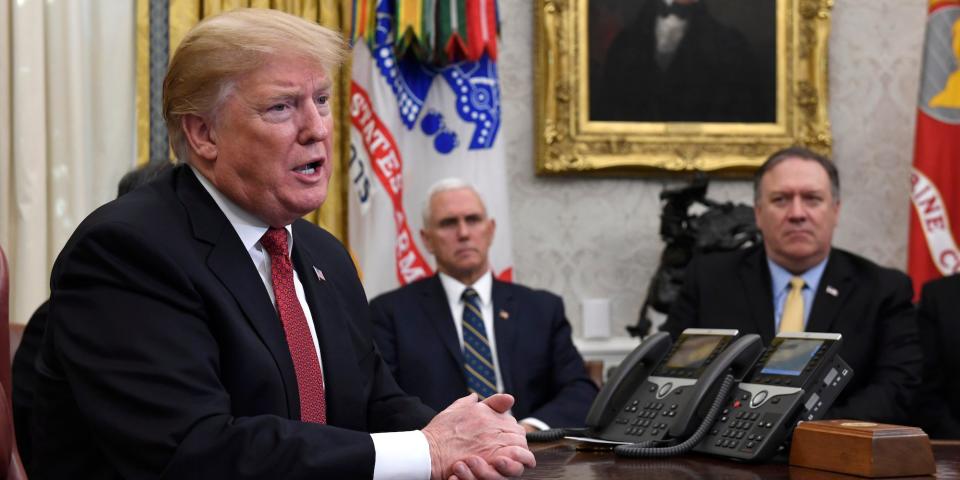Trump imposed sanctions on Turkey only after advisers explained to him the obvious consequences of letting it invade Syria, report says
AP Photo/Susan Walsh
US President Donald Trump was told by advisers Monday that his decision to withdraw US forces from northern Syria could strengthen Iran and imperil him politically, The Washington Post reported.
Ultimately, Trump imposed US sanctions on Turkey on Monday in response to the country's military incursion into northern Syria that it had long threatened to carry out.
The US withdrawal from northern Syria has plunged the region into chaos, with Kurdish militias clashing with the Turkish military, hundreds of Islamic State supporters escaping detention, and the Kurds forging a new alliance with the Syrian government, a US foe.
US President Donald Trump imposed sanctions on Turkey on Monday after being warned by advisers of further potentially dire consequences of his decision to withdraw US forces from northern Syria and essentially green light a Turkish invasion of the region, The Washington Post reported.
Several people familiar with the discussions told the publication that Secretary of State Mike Pompeo and Vice President Mike Pence played a key role in persuading the president to punish Turkey.

Trump announced the sanctions Monday night in an executive order. The measures include targeted sanctions on Turkish military officials and increased tariffs on Turkish steel.
According to the report, advisers had warned the president that the withdrawal could empower Iran, a key regional foe of the US, and imperil him politically.
It "has been a days-long effort to get him in a better place," one official said of Trump.
Trump's decision on October 6 to withdraw US forces from northern Syria, where they had fought for years alongside Kurdish militias against the Islamic State, opened the way for Turkey to launch a long-threatened military incursion into northern Syria.
Turkey considers all the Kurdish militias to be terrorist groups, and it has sought to create a zone south of its border with Syria to resettle millions of refugees.
The military operation has thrown the region into chaos, with 100,000 civilians fleeing and hundreds of prisoners loyal to the Islamic State escaping captivity.
Facing advances from Turkey, the Kurds brokered a deal with Syrian President Bashar Assad, who is backed by Iran and Russia.
Trump continued to defend the decision, despite even close allies turning against him. Trump said he was fulfilling a campaign pledge to halt what he calls the "forever wars" the US has waged in the Middle East.
Turkey's President Recep Tayyip Erdogan said Monday that Turkey's campaign would not cease until its objectives had been achieved.
